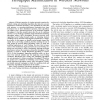Free Online Productivity Tools
i2Speak
i2Symbol
i2OCR
iTex2Img
iWeb2Print
iWeb2Shot
i2Type
iPdf2Split
iPdf2Merge
i2Bopomofo
i2Arabic
i2Style
i2Image
i2PDF
iLatex2Rtf
Sci2ools
110
Voted
INFOCOM
2008
IEEE
2008
IEEE
Multihop Local Pooling for Distributed Throughput Maximization in Wireless Networks
Abstract—Efficient operation of wireless networks requires distributed routing and scheduling algorithms that take into account interference constraints. Recently, a few algorithms for networks with primary- or secondary-interference constraints have been developed. Due to their distributed operation, these algorithms can achieve only a guaranteed fraction of the maximum possible throughput. It was also recently shown that if a set of conditions (known as Local Pooling) is satisfied, simple distributed scheduling algorithms achieve 100% throughput. However, previous work g Local Pooling focused mostly on obtaining abstract conditions and on networks with single-hop interference or singlehop traffic. In this paper, we identify several graph classes that satisfy the Local Pooling conditions, thereby enabling the use of such graphs in network design algorithms. Then, we study the multihop implications of Local Pooling. We show that in many cases, as the interference degree increases,...
Related Content
| Added | 31 May 2010 |
| Updated | 31 May 2010 |
| Type | Conference |
| Year | 2008 |
| Where | INFOCOM |
| Authors | Gil Zussman, Andrew Brzezinski, Eytan Modiano |
Comments (0)

